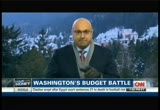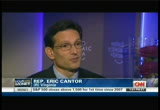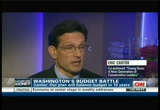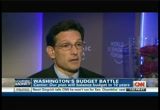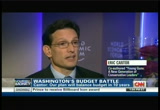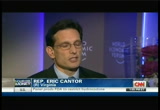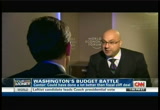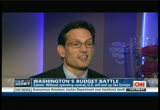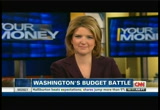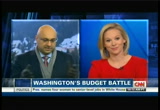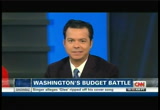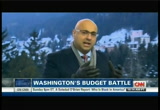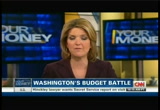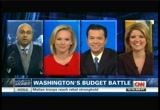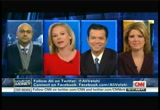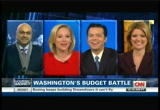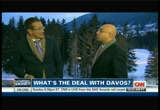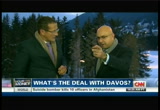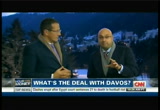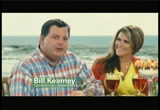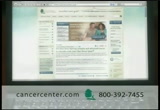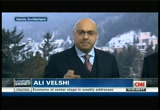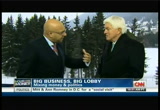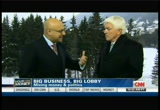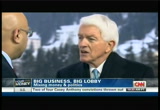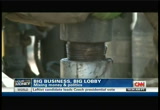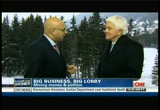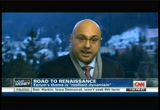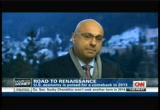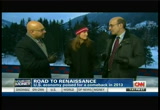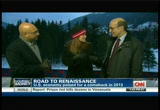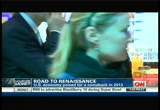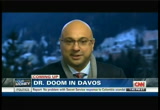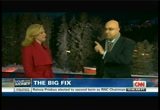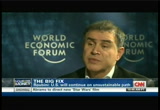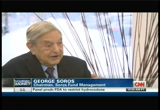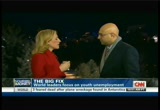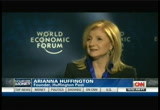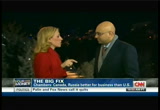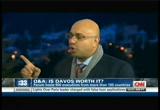tv Your Money CNN January 26, 2013 1:00pm-2:00pm EST
1:00 pm
congress voted to suspend the debt ceiling for three months this week, effectively raising the country's borrowing limit while they figure out deeper cuts to reduce the deficit. that keeps me employed for at least a few more months. even before that deadline hits again, march 1st will be on us, the so-called sequester deadline. that's a stupid washington name for a stupid and dangerous washington creation, the automatic across-the-board spending cuts. then there's another date to worry about, april 15th. not just tax filing day but the date by which congress has promised to adopt a budget resolution. they even this time stake their pay on it, agreeing to reach a deal or face suspension of their paychecks until they reach a deal. that might just be enough of a carrot to make them actually present a budget that takes on our a bah looning deficit. but that battle may make the recent battle over tax hikes for the rich seem like a friendly game of badminton.
1:01 pm
big spending cuts are needed and they will hit americans where it hurts -- in their entitlements. i'm talking about health care, medicare, social security. president obama emboldened by his re-election has already drawn his so-called line in the sand. now republicans have to come to the proverbial table. perhaps the most powerful republican in washington, eric cantor, says he and his fellow republicans will have a plan and they are ready to deal. >> i think it's important that we be here as members of the u.s. congress. there are six of us who are here. really interested in the discussion about the global economy. obviously, the u.s. economy is still a global leader. we want it to remain that way. the political debate at home has been very much about jobs and the economy. and we're here listening to some
1:02 pm
of the leaders of the eu and other entities here trying to understand how they're dealing with their problems. and i think coming out of all this will be a renewed sense that in america we can compete and we will compete and we will continue to be the destination for capital and innovation. >> and we've got a natural gas boom, an oil boom, we've got thanks to low interest rates what appears to be some sort of a housing boom. so much more can happen. in fact it seems like the only body, the only institution that might stand in the way of 2013 being a great year is congress. >> well, listen. there is certainly not the outcome that anybody wants. and i'm hoping that after we've been through the election of last november, been through a fiscal cliff debate, working our way through a debt ceiling debate, i think in a responsible manner, with an eye towards trying to fix some problems. >> when you look at the options out there, president obama's budget proposal and paul ryan's
1:03 pm
offer, they both don't do what guys like you say need to be done, balancing the budget for a long time. now you guys have a proposal or you're coming with a proposal that says you'll balance a budget in ten years. i asked paul ryan this and i can't get an answer -- how? because it's going to hurt. >> there are new baselines now in the budget. obviously we just -- as we know, some of the difficulty and the differences in washington are centered around the method of accounting, whether it's static or dynamic. because static, when you raise taxes, that additional taxes because of the cliff deal, that adjusts the baseline. that is going to make the numbers look somewhat differently. right? and we veal to make some choices, no question about it. but we have committed to putting a budget out there that will actually bring it to balance within ten years. >> there's fot got sob some big change -- >> we haven't seen the numbers
1:04 pm
yet but i'm telling you this added baseline adjustment, because of the revenues, because you're statally scoring it, is going to have an effect.ically s going to have an effect. there are things we've got to do. you cannot keep spending this kind of money, and it's driven by the health care costs coupled with the demographics. we've got to do something to control it. >> right. >> i think most people would say -- >> but there are proposals out there. paul ryan had them. the republicans couldn't get behind that either. the fact is nobody seems to want to own up to a budget that is going to hurt. there's no solution that's not going to hurt. >> the ryan budget, the last one, did balance it, almost 30 years, but the way we were trying to move said, look, like most of the private sector we want to transition from a defined benefit scenario to a defined contribution scenario. but you need to effect some real reforms in health care, delivery and compensation and payment, if you're going to have that happen. we cannot get agreement from the
1:05 pm
white house or the democrats in congress to join us in that effort. >> so wlit's spending cuts or taxes, ultimately you started by saying it's about growth. we all agree. here at the world economic fo m forum, everybody agrees it's about growth. you can achieve that by spending cuts, increased employment, but ultimately what's the thing that you can do to really move the ball forward and create growth? >> what i think that the election said more than anything else is the people of our country want to see a government that works. >> yes. regardless of whether that's about taxes or cuts. ? and we've got to -- and i hope the administration and barack obama, the president, will come and join us and say, look, it's time for us to set differences aside and do what any couple does, any group of people do, which is say, look, you're not going to agree 100% on everything and you're not going to agree 100% on anything, so find where we can agree.
1:06 pm
>> and when they did that on january 1st of the year you voted against it. they found middle ground between democrats and -- >> there was no middle ground because where were the cults? here's what we did. >> middle ground on the fact you guys asked for no tax increases, then put a threshold of a million dollars. >> we had always said, according to the boehner rule, we had always said if we're going to raise revenues through borrowing, through taxing, we've got to do something about the problem. you can't keep digging the hole deeper and keep asking people to pay more taxes. >> but you did vote against a consensus agreement. >> no. there really wasn't. there really wasn't. this was a last-minute jam of a deal that i think we could have done a lot better for american people. >> are we going to have a last-minute gem of a deal on sequestration on the debt ceiling now which is going to happen in may on a continuing resolution, on a budget? >> i hope that we can work things out and come to an agreement, that you're going to have to do something about the problem. it is about spending. we've got to get control of the
1:07 pm
spending. >> but you understand you're never going to get democrats to really agree to that so you'll have to find another way around coming to that solution. >> if we don't get control of the spending, then you're going to end up like europe. >> and don't we go back to bull simpson, then, the idea that nobody likes it but this could -- >> bowles/simpson didn't solve the spending problem. back to that, the main driver of the spending problem are the health care entitlements. bowles/simpson left that out. >> can you lead and say let's do a bowles/simpson and -- >> absolutely. we're working with the fix the debt coalition and others to say yes, let's come together both sides of the aisle. we've got proponents on our side. we're looking for those on the other side who will say let's do so. >> but you're prepared to go in and say this is what it looks like, let's talk? >> i think we've done that ever since barack obama was elected with the stimulus plan.
1:08 pm
>> many may disagree. you'll go in and say negotiate on our suggestion and come to the table. >> we consistently have done that. unform it's not been properly or accurately portrayed because it is about sitting down together and figuring out how we fix the problems for the people who put us there. >> eric cantor had his say. coming up, reaction to that interview with eric cantor. did what we just hear provide some real hope for the end of the dysfunction in washington or is it the cold swissair that's making he hear things? overmany discounts to thine customers!
1:09 pm
[old english accent] safe driver, multi-car, paid in full -- a most fulsome bounty indeed, lord jamie. thou cometh and we thy saveth! what are you doing? we doth offer so many discounts, we have some to spare. oh, you have any of those homeowners discounts? here we go. thank you. he took my shield, my lady. these are troubling times in the kingdom. more discounts than we knoweth what to do with. now that's progressive. i had[ designer ]eeling enough of just covering up
1:10 pm
my moderate to severe plaque psoriasis. i decided enough is enough. ♪ [ spa lady ] i started enbrel. it's clinically proven to provide clearer skin. [ rv guy ] enbrel may not work for everyone -- and may not clear you completely, but for many, it gets skin clearer fast, within 2 months, and keeps it clearer through 6 months. [ male announcer ] enbrel may lower your ability to fight infections. serious, sometimes fatal events, including infections, tuberculosis, lymphoma, other cancers, nervous system and blood disorders, and allergic reactions have occurred. before starting enbrel, your doctor should test you for tuberculosis and discuss whether you've been to a region where certain fungal infections are common. you should not start enbrel if you have an infection like the flu. tell your doctor if you're prone to infections, have cuts or sores, have had hepatitis b, have been treated for heart failure, or if you have symptoms such as persistent fever, bruising, bleeding, or paleness. if you've had enough, ask your dermatologist about enbrel.
1:11 pm
welcome back to "your money." i'm coming to you from the world economic forum in devoe, switzerland. you heard my interview with eric cantor, quite possibly one of the most influential republicans in congress right now. i want to head back to reaction for that. christine romans is host of "your bottom line line," john avlon, contributor, and margaret
1:12 pm
hooven is a cnn contributor and consultant. congressional approval ratings were the low nest history in 2012, they stand at 14% right now according to the most recent numbers from gallup. did anything you heard from eric cantor make you feel that 2013 is going to be a more productive legislative year, a more productive year in congress? >> well, let's be fair, ali. they've just stopped using the debt ceiling as a bargaining tool and decided to put it off for three months and try to negotiate. we can all admit that is a proak tich, constructive, positive step in the right direction. you would agree with that. secondly, he did promise to say we will work towards health care entitlement reform in a bipartisan way. you heard it. i heard it. let's see if they can move on it. some folks are shaking their heads, don't believe it, but he said it to you. let's hold him to it. >> we'll see. i asked him why rep rans and
1:13 pm
democrats didn't go with something like simpson/bowles and it looked like a plan that had something from both sides and left everyone a little bit unhappy. here's what he said. >> when the president set up the commission, he specifically told the members of that commission not to deal with health care because obama care had just passed. well, if you're not dealing with health care, you're not dealing with the main drivers of the debt. >> all right. so he's right about entitlements driving the debt. i'm glad he said that and didn't carry on with that old saw that it's government waste, which doesn't even move the needle. it is entitlements and that's going to be a bigger problem. the simpson/bowles plan included nearly $500 billion in health care savings over dwreerns as well as recommendations for a long-term budget to reduce overall spending on those problems. john weather that in mind, i have to wonder about why eric cantor said that it didn't touch health care. >> because that's become the talking point.
1:14 pm
we've seen this again and again, ali. narratives outpacing facts in our political and particularly economic debates. the bowles/simpson plan was a balanced plan. everybody gooich a little. that's its virtue as well as part of the reason it's difficult to swallow. but there were spending cuts, entitlement reforms and revenue increases. that balanced plan is the problem for republicans. the single republican representative who served on that commission supported it despite all their rhetoric about dealing with deficits and debt. >> that's not true. >> it is true. tom coburn supported it, representatives, not the senators. this is a fum problem. you have to rhetoric of bipartisanship but not the followthrough when the proposals are put on the table. we see it over and over again. >> i was trying to get beyond just debating about spending and taxes so i asked cantor about establishing a national infrastructure bank that would use a little public money but really leverage private money to rebuild the u.s.' crumbling roads, bridges, and electrical
1:15 pm
grids. >> i'm all for leveraging private capital. we need to do a lot better job at that. in my home state virginia we do a very good job-leveraging private capital for infrastructure projects p. problem with creating an infrastructure bank at the federal level is the to pas ti that comes with that.opacity that comes with that. >> it's interesting. i said can't we deal with the opacity? he was in favor of the concept of an infrastructure bank but at the state level. he said the minute you take it to the federal level it takes it out of the oversight of congress. i don't know if he liked the idea or not. >> classic conservative position. even if it's something that's a good idea, leave it in the hands of the states. this doesn't belong in the hands of the federal government. when we talk about infrastructure bank and buildup, be clear, you have interest rates at 1.8% or something for a ten-year bond. this is the time. the markets are telling us
1:16 pm
there's never been a better time to invest in infrastructure, to borrow money to informsst in infrastructure. you use the private sector do that with some guidance from the government and it could be a great idea. but you got that resistance without the federal government being involved. >> that's why that answer swouz classic and frustrating. those are weasel words. when you say you support an infrastructure bank, if legending private capital, that's what a public/private infrastructure bank does. this used to be a bipartisan idea. >> actually it used to be a republican idea. if you look at how the hoover dam was financed, it was financed by public/private infrastructure led by a republican secretary of congress who then went an to be president, named after the dam and seven states collaborated, private sector, all paid back with interest. this is not a partisan idea. >> but it's become one and that's the problem. >> it's not. i agree with you. this is the thing we're all agreed on. i'm puzzled as to why republicans don't like this idea more than they do.
1:17 pm
i buy into the idea that opacity a problem. when government gets to do things without proper oversight, things don't always go well. the stimulus of 2009 had some of that going on. but we are talking about building something from scratch. we have to try all options. do you think republicans can get behind that? >> i mean, certainly eric cantor won't be behind it, but i am working with and sort of hope to see grow a group of reformed republicans who are not these sort of reactionary traditionalist conservatives who will defend state's rights and federalism till the day they die, which frankly there is a place for. we also live in 50 states. we need infrastructure. there are constructive market-based solutions to a lot of the problems we have that i think some republicans ought to get behind. i don't think everybody echoes what cantor says. >> a good point. christine, what margaret said is key. these can be market-based
1:18 pm
solutions. we know from private organizations that infrastructure in the united states needs repair. we know from examples in other countries that if you have proper infrastructure it over time attracts business and we can shed this whole nonsense about taking on debt for our grandchildren if we create a place where it's fascinating and profitable to do business. >> and it's economic security for your grandchildren. i guess this becomes a message that has to change here where instead of talking about spending and federal government getting bigger and more involved in the economy and your life we have to be talking about investing and using the government the way it should be to invest and put us in the right position so we can compete with the rest of the world that by the world is going crazy doing infrastructure spending using cash in many cases to do it, something we don't have. >> just changing the words won't fix it. obama has also said investing as a synonym for spending. investing has to be investing. >> if we can't get behind a no-brainer like this, a
1:19 pm
public/private infrastructure bank, we have a real problem. this is leveraging, private capit capital, should be a no-brainer and it's ridiculous that it's continue tended where the rubber meets the road. >> a no-brainer no matter what side you're on. christy thanks you so much. margaret and john, stop playing footsie. one man, two skis, multiple falls. richard quest is fresh off the bunny slope. ♪ my friends are al ♪ my friends, they do surround me ♪ ♪ i hope this never ends ♪ and we'll be the best of friends ♪ ♪ all set? all set. [ male announcer ] introducing the reimagined 2013 chevrolet traverse, with spacious seating for up to eight. imagine that.
1:22 pm
all right. richard quest joins me now. he is the host of "quest means business" on cnn international. a perennial all-star in davos. richard, give our viewers a look at what this place, davos, and the world economic forum is really like. where in world are we? davos is europe's highest city, located in the eastern part of switzerland in the alps. most of us flew into zurich and then took three trains to get here. it is, however, a really beautiful place, known for great skiing and upscale hotels. it's also really expensive in january. i've been eating pizza all too much this week, 25 bucks for a little pizza, $13 far pint of here in this town. it's costly. >> laundry, three shirts, four pairs of small, and a few socks, about $100. >> yeah.
1:23 pm
it's very expensive. >>st unbelievable. >> you've got the top 1% of the 1% who are here. but mixed in you have great business people, entrepreneurs, academics and intellectuals. they've all come around to some ideas. >> and they have, and they've all got a point to make. howard ludnick, for example, the head of cantor fitzgerald. everybody's worried about europe. l ludnick's worried about the u.s. >> the republican party who was elected to control the congress the same time as obama was elected are going to cross their arms and they are not going to raise the debt ceiling ultimately unless they get severe spending cuts and the obama administration is not going to give it to them. you're going to watch the u.s. do crazy, crazy things this year. >> he was pretty clear. he called it crazy. i talked to eric cantor earlier, the republican majority leader. he sort of said we're ready to deal and compromise, but people
1:24 pm
are very worried about what the u.s. could do. >> oh, and this latest decision to just kick the can, i hate to use the cliche, further down the road, axel neighbor is a former central banker in europe, also the head of ubs and he was absolutely in no doubt that what we are seeing in the u.s. in the political and economic process is dangerous. >> if you have the debt ceiling, the europeans will talk about how you can make that binding. in the u.s., the concern is much more whether you can lift it in time in order not to put too much break on the economy. now, the u.s. economy has bottomed out, it's coming back, and i think sooner or later the u.s. has to face the fiscal issue not just in the sense of delaying adjustment but really making a credible adjustment. >> this is very reminiscent of the conversations we were having a year ago about europe. from the outside it looked obvious, have to get your house
1:25 pm
in order, you know what the decisions are likely to be, you have to just do them. now i hear everybody in europe saying you know what you need to do, you just need to do it. >> they were particularly amaze t at the latest decision to suspend the ceiling once again. don't just go tying it to this congressional pay. instead of just simply doing it. >> right. coming up with gimmicks and -- >> well, shackling, shackling something onto the side of it. >> right. well, they said this time if they don't do it they're going to stop getting paid. congressmen are going to stop getting paid. there's another ceo, very interesting guy, the ceo of dow chemical, tallas author of a book about manufacturing. he says one of the problems in the united states and in developed countries is we see manufacturing as the old and the past whereas a lot of developing countries see it as the future and the road to prosperity. here's what he told us. >> manufacturers go to small towns. manufacturers have barbershops that supply them and local
1:26 pm
cafeter cafeterias. to educate communities around the world that this is vital for job growth because we have a jobs crisis today, ali, and manufacturing is the solution space for the jobs crisis. >> so, andrew liveris talking about job creation. the theme of dynamism has emerged over the course of the week here to jobs. >> i came here thinking they were absolutely stark-raving mad with resilient dynamism. now i'm starring to think it was a stroke of genius because it's allowed everybody to grab onto something and that developed into the theme jobs. >> well, listen, a few long working days here at davos. we've interviewed a lot of people, attended a lot of sessions. some of the best work is done just in the hallway having conversations with people. but this is a beautiful place and a pretty fun place to be. there are a lot of [ indiscernible ]s and parties and of course the skiing. richard, before we got started, hit the slopes. but being the true journalist
1:27 pm
that he is, you asked people how they were feeling about the economy. what did they tell you? >> they are all slightly worried because things are getting better but the risks -- it's all about risks, ali. >> right. >> again and again and again people say ris, risk, risk. >> we're not done here. you can't hit the slopes just yet because we're going to talk more. richard quest with me here in davos. listen, you heard a lot from the ceos and others about what's going on in the world and at davos, but there's one man in the united states who holds no elected office and yet could stand in the way of president obama fulfilling the agenda that he's promised. at 1:45, the aflac duck was brought in
1:28 pm
with multiple lacerations to the wing and a fractured beak. surgery was successful, but he will be in a cast until it is fully healed, possibly several months. so, if the duck isn't able to work, how will he pay for his living expenses? aflac. like his rent and car payments? aflac. what about gas and groceries? aflac. cell phone? aflac, but i doubt he'll be using his phone for quite a while cause like i said, he has a fractured beak. [ male announcer ] send the aflac duck a get-well card at getwellduck.com. [ male announcer ] send the aflac duck a get-well card we've decided to we're all having such a great year in the gulf, put aside our rivalry. 'cause all our states are great. and now is when the gulf gets even better. the beaches and waters couldn't be more beautiful. take a boat ride or just lay in the sun. enjoy the wildlife and natural beauty. and don't forget our amazing seafood. so come to the gulf, you'll have a great time. especially in alabama. you mean mississippi.
1:29 pm
1:30 pm
1:31 pm
commerce. he joins me now. tom, good to see you. thanks for being with us. tom so much has happened with you in the last few years. you have been a force to reckon with for this administration, and in fact you sort of went down some paths to not see them re-elected, they got re-elected. what's your relationship with the president and the administration going to be? >> first, we have nothing do with presidential elections. we of course involve ourselves in senatorial and congressional elections and others. our relationship with the white house is very broad. we have helped them on many issues. we have opposed them on issues. we work closely with treasury and omb and others and from time to time with people directly in the white house. >> you'd say it's good? >> i'd say i have to deal with the white house on the baf of the american business community, and they have to deal with us. >> you've taken harder political positions in the last few years. let's talk act one. you didn't like the climate
1:32 pm
change stuff the administration was up to. they may go into that again in the second term. probably not the highest priority but they may go down that road. >> i think it is a high priority. it was the first thing the president said when he did his inaugural address, and he isn't going to go to the congress to do it. he's going to do it on a regulatory basis. and if you look what he's brought out of the epa for, he can do a lot more going forward and we're all going to have to work on that. >> let's talk act spending cuts. one of the things you'd like to see is deficits getting under control, spending cuts. here we are in europe where the austerity of the sort that they imposed is not certainly in the short term working. we've just seen new unemployment numbers out of spain and portugal. spain had 26%. youth unemployment at 16%. we got to the point we're lapping ourselves in europe because so many are unemployed that the idea of organic growth anytime in the next five years is impossible to see. how do we manage that in the united states? how do we manage a cutsome
1:33 pm
spending that doesn't send us into a downward growth spiral? >> it's where you gutcut the spending. you're absolutely right the way you evaluated the trouble in europe, and that's a problem for us because they're our largest export partner. but the spending that we want to adjust is the spending that is automatic, and that is entitlements. social security a little bit but primarily medicare. >> right. >> and it goes up, up, up, and the problem is people living much longer than anybody thought. you don't have to cut it. you have to turn the curve down and make some adjustments. if you do it, a, you'll get some benefit in budgets, a lot of benefit in debt. >> we got waylaid a little bit in the past four years talking about government waste and fraud and stuff like that. in the long term, that's not the stuff that moves the deal. what you're talking about is what we have to change. >> it's entitlements. we have to fix social security because for years we've been spending the surplus. now we're having to borrow money to pay social security.
1:34 pm
medicare, we borrowed 3 out of every 4 dollars and have from the beginning that we have spent. we have to fix it. >> what's your recommendation for the process of how we if i can it? we have the math. we know how to do it but can't get it done. >> i've got a process different than some people do. we've been talking about fixing this in two buckets, one reducing costs and another bucket is increasing taxes. if you think you can get this all done for the am we have to do with say a ten year program you have to dig deep. we have a third bucket and it's sitting there and we should use it. it's energy. fracking, for example, has created 1,750,000 jobs in less than two years. billions and billions of dollars going to the states and the federal coffers. we have more energy than anybody in the world. and if we -- in an environmentally friendly way -- acquire it, go on the federal lands, do it in the right way, we'll get that extra piece of
1:35 pm
cash and bring manufacturing and jobs back to the united states or create them in the united states because of our energy. >> the last four years of the obama presidency was marred by not great relationships between the business community and the administration. you are one of the key faces of the business community. have you reached out to the president or has he reached out to you since his election to say let's make this four years look very different? >> just remember my job's to represent the business people, he's the president of the united states. >> right. >> we deal with each other when we should and when we need to, and sometimes we agree, sometimes we don't. >> but do you have a good relationship with him? would lou yao like a better relationship with him? >> oh, i would like to have a more regular relationship with him, but we're doing just fine. >> very good to hear that, tom. great to see you. come back and talk to us. we want to talk about my home country of canada. some examples there. >> the great canadian miracle is
1:36 pm
something we should follow. >> not the health care part, though, right? >> no. thank you very much. >> good to see you. tom donahue, president and ceo of the u.s. chamber of commerce. >> thank you very much. this year's theme at davos isdynamism. not sure exactly what that means. i'll explain why america's renaissance is enough to make the europeans envious. tonight. uhh, it's next month, actually... eddie continues singing: to tickets to... paradiiiiiise! no four. remember? whoooa whooaa whooo! you know ronny, folks who save hundreds of dollars by switching to geico sure are happy. and how happy are they jimmy? happier than eddie money running a travel agency. get happy. get geico. fifteen minutes could save you fifteen percent or more.
1:37 pm
1:39 pm
we are in davos for the world economic forum. resilient dynamism. that's the theme of this year's world economic forum. i am still trying to figure out what that means. we are certainly seeing resilience in the u.s. economy assuming, of course, our elected leaders can get out of the way and the political dysfunction that has become the norm in washington doesn't drag down the still-fragile recovery. but as i told you before, if washington doesn't interfere, if they actually help, the u.s. is on the road to economic renaissance. now, if we're talking resilient, jobs in the u.s. are coming back. they've come back to some degree, job growth is not nearly as strong as we'd like it to be,
1:40 pm
as most economists think we need it to be, but the u.s. economy has added jobs for 27 straight month months, .8 million jobs alone in 2012. 2012 was the best year for home sales since 2007 before the recession began. 4.7 million homes were sold. prices are rising. fewer americans have underwater mortgages and mortgage rates are hovering near record lows. and talk about dynamic, america is beginning to reap the rewards of a domestic energy boom. we are extracting record amounts of oil and gas from shale rock through fracking and other new technologies that's pushing down prices for natural gas, which is used in part to generate electricity. now, that helps utilities and heavy industry compete, creating more jobs for americans. in the meantime, europe is not looking as resilient or nearly as dynamic. there are fears of a triple-dip recession in the united kingdom
1:41 pm
after british gdp shrank in the final three months of last year. earlier this week the international monetary fund downgraded its forecast for the entire eurozone to a second consecutive year of recession. ken rogoff is a professor at harvard, former chief economist for the international monetary fund. chrystia, welcome. ken, the uk, this business of a triple dip. the movements have been very small between the third quarter and fourth quarter. a lot of economists say don't worry about that just yet. >> yeah. it's reflecting what what's going on in europe. they had a deeper financial crisis. they didn't have the energy boom you're talking about. otherwise they'd look a lot like the united states. >> don't you think, though, also it is that they cut deeper? >> that's the theme we're talking about this year. >> the uk had a gigantic prestimulus and they have been gradually pulling out but the
1:42 pm
budget deficits are sort of the same. they followed a similar path bottom line. yorm think that's where it's coming from. i think it's the bigger, more important financial system, london, just dominates london. they're right next to europe, which you just said, in the second year of recession. that sounds like a good forecast to me. and at the same time the energy boom i think is worth a percent a year. >> right. >> by the way, we have more population growth. so it's different. >> a lot of things in the u.s. are looking different. chrystia, talk about the energy boom for a moment. there are some real jobs to be created. there's a real sense that it's bringing electricity prices down. i've spoken to a number of manufacturing ceos this week who think that, you know, they're not paying as much attention to washington. they're thinking there's real hope in the u.s. >> one of the things i've been really struck by here at davos is the real optimism around the u.s. economy. and that's something you're hearing a lot from the american business people but also from business people from other parts of the world. and very closely tied to that is
1:43 pm
people have now gotten that there is a u.s. energy story and there is a lot of enthusiasm around that. a question i have in my mind is, you know, to what extent that energy boom can be squared with the pressure i think president obama is under from some wings of his party to really push an environmental agenda in his second term. >> i'd just qualify that by a lot of the multinational corporations people operate in the united states and all over the world saying we're optimistic about the united states but we're not seeing it. our sales aren't that good. not much is happening. maybe it's because january nothing happens. it will all happen in march. but there's a cautious optimism because the numbers on the ground, their business isn't showing it yet. >> i agree with that. it's a looking-forward optimism but they are all saying that same looking forward optimism, which they weren't last year. >> yeah. they were liking the u.s. better than europe last year and
1:44 pm
they're maybe liking it much better this year. >> let me ask you this. there's a different part that goes on here and that is these sessions, these ideas, these smart people who come out and say things. some are just political but some, you know, have some great ideas. did anything strike you, ken, that something we can build on, that's just going to be economically exciting? >> well, i have to tell you the thing which has struck me the most has not been there but talk act cybersecurity and you talk to these, you know, big energy kop corporations, you don't see it in the news, what goes on, security, also political instability, what's going on in some of the countries of very large muslim populations, the tensions between the radicals and the moderates. in general i would say a theme i've come out with here is people are more worried about geopolitical stability. i don't know if it's worse or they're just less worried about everything else. >> i would agree with that. the other big theme i heard a lot of people talking about touches on ken's world, which is, is the educational sector
1:45 pm
going to be the next sector which is seriously disrupted by the technology revolution. it sort of feels as if maybe some of those online education technologies that have been on the brink for a little while might really start to come good this year. >> every 23-year-old in boston has an education start-up by the way going. that's the new thing. >> one might be the next mark zuckerberg. >> we hope so. >> good to see you both here. ken rogoff and chrystia free land. this year's theme is resilient dynamism. i have a hunch you are in yell roubini doesn't agree. >> we'll continue for years to come and something will crack eventually. >> i'll introduce you to the economist they call dr. doom. [ female announcer ] what if the next big thing, isn't a thing at all?
1:46 pm
it's lots of things. all waking up. connecting to the global phenomenon we call the internet of everything. ♪ it's going to be amazing. and exciting. and maybe, most remarkably, not that far away. we're going to wake the world up. and watch, with eyes wide, as it gets to work. cisco. tomorrow starts here. visit washington dc every year. some come to witness... some to be heard. we come to make an impact. to learn from leaders...
1:47 pm
and to lead others. to create... and create change. we are the george washington university... we come to make history. we are the george washington university... we've decided to we're all having such a great year in the gulf, put aside our rivalry. 'cause all our states are great. and now is when the gulf gets even better. the beaches and waters couldn't be more beautiful. take a boat ride or just lay in the sun. enjoy the wildlife and natural beauty. and don't forget our amazing seafood. so come to the gulf, you'll have a great time. especially in alabama. you mean mississippi. that's florida. say louisiana or there's no dessert. brought to you by bp and all of us who call the gulf home. ♪ [ male announcer ] this is karen and jeremiah. they don't know it yet, but they're gonna fall in love, get married, have a couple of kids, [ children laughing ] move to the country, and live a long, happy life together
1:48 pm
where they almost never fight about money. [ dog barks ] because right after they get married, they'll find some retirement people who are paid on salary, not commission. they'll get straightforward guidance and be able to focus on other things, like each other, which isn't rocket science. it's just common sense. from td ameritrade. if you've watched me before you know i've been telling you the united states is headed for an economic renaissance. the manufacturing sector is getting a boost from a boom in domestic energy production. the s&p 500, you may have an investment that looks like that, is at a five-year high. the housing market seems to have hit bottom and is on its way back up but not everybody is as hospital mystic as i am. poppy harlow is optimistic but she sat down with nouriel roubini, the world-renowned economist they call dr. doom for famously predicting the recent
1:49 pm
financial crisis. he certainly doesn't see things the way i do. >> he opportunity, but consider the source. dr. doom, very bearish on the u.s. economy for last five, six years. but he has two main points, and that is persistent growth in the united states and this huge fiscal drag. here's how he explained it to me. >> recently tax increases and spending cuts at least 1.4% fiscal drag. now, the if the economy was growing robustly about 3.5%, we get a fiscal drag of 1.4% for a deal, big deal, 2.4 for the year. but the economy has been barely growing 2% so, you subtract $1.4 hearse and you get zero. in the u.s., rates are lower and will stay low for many reasons so there's no market pressure to break the gridlock. so we're going to continue on unsustainable economic and fiscal policies for years to come and then something will crack eventually.
1:50 pm
>> saying something's going to crack eventually. it's interesting because he says, look, europe has this market pressure to do something. in the u.s. we don't yet so, he's saying basically this lack of policy, lack of pressure on p with us. >> so the idea is how do you spur growth in the economy. there are different opinions how you do that. you also sat down with the billionaire investor george soros. what did he have to say? >> this man describes himself as a bleeding heart liberal. he said the u.s. is in the best position of any major economy now but he also said the only way to spur growth, spur jobs is to spend a lot more money. >> having additional stimulus. >> you want more stimulus. >> actually, fiscal stimulus combined with quantitative easing where the central bank effectively buys the debt that the government issues is about as close to a free lunch that you can have when you have
1:51 pm
unemployed resources. putting them to work is much better than cutting back going the wrong way. >> so he thinks we need to spend. he's a critic of austerity here in europe. i said what do you want to spend more government on? he said infrastructure. you've talked a lot about an from structure bank and also education will pay for themselves in the long run. >> some other news came out in the middle of the week though for the last three months of 201, stain's unemployment hit a record for the quarter. 26%. 60% youth unemployment. >> that's unbelievable. you have the same problem even in a stronger country like germany. angela merkel said youth unemployment is such a huge problem. ariana huffington is also very vocal politically. what she said her top concern is surprised me. lis. >> and for me the biggest crisis not being creased out of
1:52 pm
washington is youth unemployment. it's the fact that 50% of college graduates either can't get a job or are doing a job for which they would not have needed an college degree. that's not sustainable. that really goes right against the american dream, which is based on the assumption that you work hard, you play by the rules, and then you do well and even better than your parents. >> i think really as i've watched over the last five years since the crisis, companies have learned how to operate so much more leanly. >> right. >> they're just not going to breng on the amount of people they had before. so isn't there a real fundamental issue there for job creation? >> businesses have multiple bottom lines we're beginning to learn. it's the bottom line that is the is on the to their shareholders. but it's also the bottom line that is the responsibility to the public. and to the general stakeholders beyond their shareholders.
1:53 pm
and after all, a country where half its youth graduates from college and cannot get a job is not the best environment in which to run a business. >> so that's interesting because this is a woman who is now one of the top positions at a public company. at aol. so then someone on the complete opposite side i talked to, john chambers, ceo of cisco, staunch republican, endorsed romney. he said they've got nearly $40 billion overseas. he has no intention of bringing it back to the u.s. unless policy changes. he said the place to do business. >> let me guess. >> what. >> then russia. he's making appoint with russia. he's making a point with russia, but canada. >> interesting. >> he just thinks if the policy doesn't change here, he's not going to bring the money to work here. you acquire companies where you're wanted clearly sending a message to the administration. i don't know if it's going to change everything.
1:54 pm
1:57 pm
richard, a little q and a. quest and ali. richard quest is the host of "fest means business." our topic today, davos. is it worth it? we're on your home court on the european continent. i know you're in britain. it's not the same thing. >> you go first. >> i'll go first. start the clock, working the bell. it's davos switzerland and i have a story to tell. richard, 2500 participants from more than 100 countries including 900 top business executives, more media than you'd see at the oscars have descended upon this beautiful town nestled in the swiss alps. i bumped into charlize theron, derek jeter. i got shoved off the sidewalk by david cameron's bodyguards. i ripped my pants. someone made fun of my dressing and someone stole my hat. it's been a blast. i'm not sure this is what claus schwab, is the german professor who founded this forum 43 years ago had in mind but he throws quite a shin dig up here in the
1:58 pm
alps. it's pie first one, as you know. i see why it gets bigger every year. this is not place really where deals get done on treaties get signed but where big ideas get thrown into a somewhat controlled mosh pit of executives, world leaders, movie stars and big thinkers. somewhere in the midst there, there is probably -- there are probably some good ideas that come out of. i thought it was worth it. >> my turn. say when. >> they say here in davos the world economic forum committed to improving the state of the world. what a pompous piece of arrogant nonsense that is. but the truth is, even though everybody says they're never coming back here again, that it is a talking shop, a lot of hot air in the cold swiss mountains, the truth is, once you get here,
1:59 pm
there is an inaable atmosphere, a hot house arrives, and issues that you never really expected to go onto the agenda suddenly arrived. people put in the same room, ceos, ministers, ngos, yes, even old hacks like us, we come together and people start discussing issues. davos was never meant to be a place where decisions were taken, communiques written, statements made. it was always meant to be that place where you had a conversation an idea was sparked. do you need to bring 5,000 people? no, but at least it exists. >> it was a week where we've learned a lot and spoken to a lot of people and hopefully given our viewers some access to them. thank you for teaching me the ropes. you can have your bell back. i want to hear what you think about davos. my interview with congressman canter or anything else we discussed today.
80 Views
IN COLLECTIONS
CNN Television Archive
Television Archive  Television Archive News Search Service
Television Archive News Search Service 
Uploaded by TV Archive on

 Live Music Archive
Live Music Archive Librivox Free Audio
Librivox Free Audio Metropolitan Museum
Metropolitan Museum Cleveland Museum of Art
Cleveland Museum of Art Internet Arcade
Internet Arcade Console Living Room
Console Living Room Books to Borrow
Books to Borrow Open Library
Open Library TV News
TV News Understanding 9/11
Understanding 9/11
